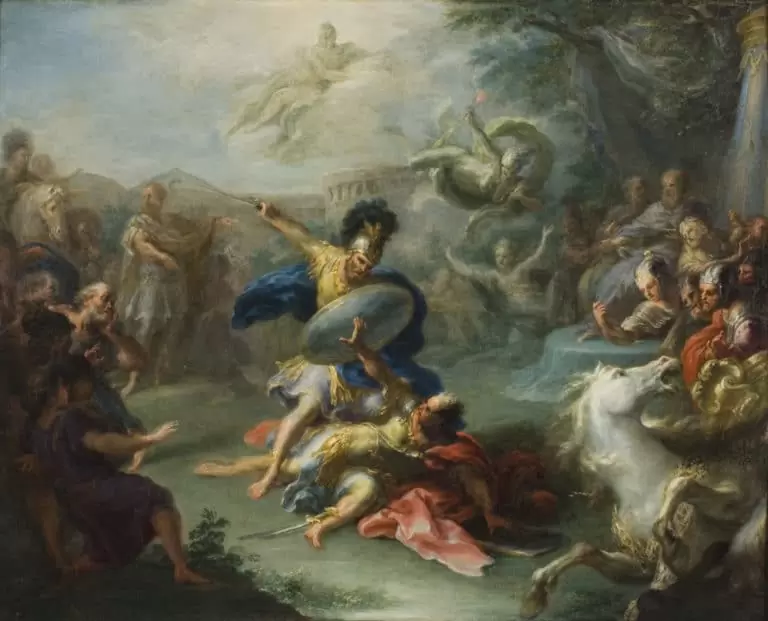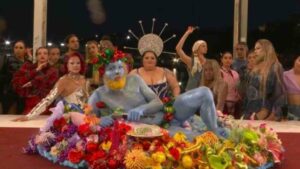
Towards the fortress
|
Getting your Trinity Audio player ready...
|
Without a doubt, current times are marked by weakness. The unequivocal fate of today's generations is inability and consequent failure. The American psychologist, Jonathan Haidt, already said it in ““The coddling of the American mind” (2018): the new generations have adopted three rules as dogmas, and I am only paraphrasing: “the world is divided between good and bad”; “my subjectivity is the source of my alleged certainty” and; Lastly, although precisely the most important for the issue at hand, “what does not kill me, makes me weaker.” Today every normal, everyday situation in life is an opportunity to feel offended and show off our fragility. Therefore, the safety spaces They are abundant in schools, universities and workplaces; Spaces are required where we can escape from reality, the one that distresses us with every refusal that is immediately thrown at us, at every attempt to subvert it. The left, whether the classic left or its sixty-something post-Marxist version, has sought to promote a political agenda aligned, precisely, with this weakness. An attempt is made to promote it, consolidate it. The more helpless people are, the more needy they are of the state agency, of politicians and their gifts. The right, especially its Fukuyamian version, as indicated by Juan Cristóbal Demian in “New right: An alternative in progress” (2020), unfortunately, does not find a way to reverse this situation. He is not even, I dare say, aware of the problem. As Axel Kaiser has attested in “The fatal ignorance” (2009), what reigns on the right is cultural anorexia and this situation has not allowed this sector to be alert to what is happening.
However, a certain sector of the right, not the perverted one, but the most genuine, has for some time now raised its head and, by the way, its fists, not allowing itself to be fooled by the agenda that the international and national left promotes. And, there is no doubt, it has sought a way to return to certain basic guidelines that, it is suspected, can revive the strength that, at some point, characterized the sector. For my part, I have pointed out a path that can take us on the right path, a way of creating the historical consciousness necessary to configure a complete profile of the man of the right, within which not only does it fit, but it is imperative that there is strength, between other characteristics that must accompany it[1]. Despite the historical-philosophical imprint that my project promotes for the right, there are also literary expressions that illustrate this route. Specifically, regarding fortitude as a virtue, I would like to illuminate the path through the song of the Roman poet, Publius Virgil Marón, or simply Virgil, and his great opera, the "Aeneid” (between 29 BC and 19 BC), a poem written to praise the glories of Rome and the arrival of Octavian to power, but which, this time, will exalt with its metrics the path indicated for the awakening of a literally strengthened right. Let the adventures of Aeneas' journey, then, be those headlights that illuminate the way.
First, we must begin by telling the glorious story of the Trojan prince. This begins near the island of Sicily. After sailing for years following the destinations that the foundation of the Roman lineage has reserved for it, it is finally approaching the lands of the peninsula. However, the goddess Juno, aware of the joyful destiny that awaits the Trojans, tries to prevent their arrival. To achieve his goal, he asks Aeolus to use his winds to make the fugitives shipwreck. The god agrees to help the capricious and hurt divinity, and the Trojans end up dispersing into the sea. When Neptune, god of the Sea, knows this, he feels insulted and helps sailors reach safer beaches, specifically, Libya. Once they arrive in calmer waters, Venus, Aeneas's mother, appears to him in the form of a Spartan virgin and informs him that the lands where they are located belong to Queen Dido. Then, the Trojan prince, aware of the queen's personal history, heads to the city, while some of his companions are already there, asking Dido for shelter and help to search for Aeneas. When he appears unexpectedly, and after a very favorable first impression, Dido welcomes him along with the rest of the Trojans. After the arrival of the Trojans to the kingdoms of Dido, and with the intention that there be no major conflicts between her and Aeneas, the goddess Venus asks Cupid to take the form of her maternal nephew, Ascanius, supplant him and instill in the love reigns for the hero. Convinced, then, the god of love instills in the queen a passionate affection for the son of Anchises, but this conflicts her, since she had promised herself never to remarry nor to submit to a man again. During the banquet in honor of the newcomers, however, Dido, enthralled, asks Aeneas to tell of her misfortunes.
It is at this precise moment in the poem that we are made aware of all the adventures that the Trojan hero had to go through to get there.
The story that Aeneas tells opens with the appearance of Ulysses' horse on the Trojan beach, who, along with other Greek soldiers, hides inside it, while the rest of the Greek troops are stationed on the island of Ténedos. The Trojans, ignoring Laocoön's deception and warnings, believe that the Greeks have fled and bring the horse into their city as a celebration of the apparent triumph. When night comes, those from the Peloponnese leave the wooden horse and open the city gates for the other Greeks to enter, subjecting Troy to the debacle. At the moment the destruction begins, Prince Hector appears to Aeneas in his dreams, who announces the end of Troy and orders him to run to his people and the relics of the city. Deciding not to leave without a fight, he goes in search of Priam's palace and contemplates the death of him and his son, Polites. Likewise, in the midst of the chaos, he sees Helena and, full of anger, prepares to punish her for pinning the cause of the war on her. However, Venus tells her to restrain herself, because the true culprits of everything are the gods, not her. Aeneas then searches for and finds his father, Anchises, and his son, Ascanius. At first, his father does not want to leave, until a divine omen convinces him. Then, they escape the burning city. However, in the process of fleeing, he loses sight of his wife, Creúsa, who, finally, is another victim of the Achaean massacre. Aeneas loses hope of finding her, although he desperately searches for her. Ultimately, her shadow appears to him, revealing to him that his destiny is the founding of Rome. For the same reason, and faithfully following divine fate, Aeneas returns to his people and prepares what is necessary for departure.
Already on the march, Aeneas arrives at the city of the Thracians, whom he considers allies. In those lands he wants to found the new city, but, when lighting the sacrificial bonfire that will ask for good omens, he takes some branches that begin to bleed. A voice sounds from inside the mound and warns him that the king of Thrace is not an ally, but is in favor of the Greeks. The travelers decide to leave the place. Then, they direct their steps to Delos. There the oracles of Apollo reveal to them that they will have to found a new city where their ancestors lived, stating that the coming generations of Trojans will be the only ones dominating the world. Rome's promising future is latent. However, Anchises is confused and thinks that the oracle refers to Crete, the place of worship of the goddess Cybele and the land where Jupiter was hidden. Then, that's where they head. Arrived on the island, they founded the city of Pergamon. However, after a certain time passes, a severe drought occurs and men and beasts die. Later, the Penates, the gods of the city of Troy, will appear to Aeneas in his dreams, commanded by Apollo. From them he will know that the lands referred to by the oracle of Apollo are from Latium. The Trojans set to sea again, and after confronting the harpies and passing near Ithaca, Aeneas learns that a son of Priam, Helenus, has married Andromache, widow of Hector, who, after the death of Priam, Trojan hero, had been concubine of Pyrrhus, but now reigned in Butrinth, a nearby city. That's where the Trojans will go. Already in the palace, Helenus predicts to Aeneas that he will indeed arrive in Italy, but that, to settle permanently, he will have to suffer a little more, since Greeks lived there. Furthermore, he advises him to beware of Scylla and Charybdis, formidable sea monsters, and to listen to the oracle of the Sibyl of Cumae, which will be of great help in his purposes. Following the advice of Priam's son, the Trojans pass by the Ceraunias mountains and, before heading to Thrinacia, offer sacrifices to Juno and Minerva. Already close to the Strait of Messina, trying to avoid Scylla, they almost end up decimated by Charybdis, but the whirlpool of the beast propels them out to sea, and thus, lost, they arrive at the coast of the Cyclopes, an island from which they will fortunately escape. . Unfortunately, although they continue their journey, passing through Ortygia, and then through the port of Drépano, their father, Anchises, dies.
It is after the story of this sad occurrence that Aeneas remains silent and finishes reviewing the events of his trip. Then, Queen Dido decides to share her feelings with her sister Anne, to whom she tells her dilemma, since she has fallen madly in love with the Trojan hero, but continues to respect the memory of Sycheus, her late husband, killed by her brother. Her sister encourages her to move forward with her love, since, since she was widowed, she had rejected many suitors and has not been happy. The latter reaches the ears of Juno, who decides to ally herself with Venus so that Aeneas in turn falls in love with Dido, with the intention that he never reaches Italy and stays in Carthage, forever. Venus accepts the proposal and they devise a plan together so that they both consume the hymeneum. Then one day, Aeneas and Dido go hunting. During the departure, the goddesses send a great storm. Aeneas and Dido take refuge in a cave and show their love. The rumor spreads and the news of the love encounter reaches Iarbas, king of Numibia, and Dido's rejected suitor, who, enraged, begs Jupiter not to allow Aeneas to stay with her. The god of thunder and the skies listens to him and, fearing that Aeneas will stop his journey to Italy, sends Mercury to remind him that his destiny is to found Rome. The Trojan, showing brave strength and courage, convinces himself not to delay his trip any longer, but he does not know how to tell the queen, so he decides to order his soldiers to quietly prepare the fleet. But, rumors fly again, and Dido finds out what is happening. When he goes to reproach him and beg him to stay, the Trojan does not give in, arguing that his fate has already been decided. Dido, although not satisfied with his reasons, allows his departure, but, while doing so, asks his sister to convince him to set sail with a favorable wind and in better weather conditions, in order to save time.
The pain that Aeneas's departure causes Dido drives her to commit suicide and she devises a secret plan with the help of a priestess to carry it out. Mercury visits Aeneas again in his dreams, hastening his departure. Dido finds out and then puts what was planned into action. He builds a large pyre with objects from Aeneas, surrounded by altars and sacrifices, climbs on it and sticks the sword that Aeneas had given him into his aching chest. In the midst of the death speech he screams, he cries out for an avenger, which will mark the future relations between Rome and Carthage. Having already set sail, Aeneas sees from the sea the flame burning on the coast of the city, and laments, because he knows what it is about.
Here we can stop to reflect, as we find the first signs of a foolproof strength, perhaps one of the clearest that the book offers us. Until now we have focused on the story of the Trojan and the adventures he faced to follow his assigned destiny. However, we had not stopped at why the hero follows the postulates of the gods, even against his own will. Being strong is not just a physical issue, which Aeneas unquestionably displays. While fleeing Troy, Hector's cousin showed unmistakable signs of his physical strength, and murdered every Achaean he faced to save his people, although he was ultimately unsuccessful in saving the city. However, as we already know, he was able to contain his angry impulse against Helen and, listening to his mother, Venus, and his deceased wife, Creusa, he withdrew from the battlefield. Containing oneself, being able to qualify one's desire for revenge, is already a total sign of strength. Accepting the death of his wife was also important, and that of his father, on the way to Latium, is even more so. But, perhaps, an even more portentous demonstration of this is his having left Dido to follow the postulates of the gods. It is difficult to fully understand why such an action is undertaken from a modern mentality, or worse, a postmodern one. Once the Kantian and Rousseunian postulates were installed in the modern mind, we became convinced that our destiny is controlled by ourselves, by our decisions, which do not encounter heteronomous obstacles, specifically, from other people's wills.
Except for certain ethical constraints, our will is total, even more so understanding that these moral norms are nothing more than the result of the categorical imperative that we find in ourselves and that must pass, beyond certain more complex formulations, simply through a test constructed from our subjectivity. Immanuel Kant already said it in Groundwork of the Metaphysics of Morals (1785): act according to your maxim can become a universal law. On the other hand, the ancient mentality is not ideological, it does not follow these postulates, since it does not assume man and his subjective ideas above reality; On the contrary, it offers a worldview, which implies that it places the human being “in relationship” with others and with otherness itself, that is, with the set of what “is.” Aeneas fully participates, understanding himself in relation to otherness, represented by the gods who, although at their whim they led the Trojans and Achaeans into battle, now hold a glorious destiny for the hero. Of course, it is not that Kant proposed a totally subjectivist ethical system, but, conceptually, he laid the foundations for the nihilism so typical of our era. On the contrary, the strength of following the path, of projecting yourself in a world that demands you, assuming the challenge, marking your objective of virtue as the archer does with his arrow, is what is fully ethical, even above your immediate banal desires, as it would be to continue in Dido's arms.
We will delve into this deeply ancient and, therefore, very strong ethic later, once we further illustrate the virtuous image that Aeneas represents.
Once they set sail from the Libyan lands, the travelers, after overcoming another storm, arrive in Trinacia. In these lands, Acestes receives them. While they are there, it is one year since Anchises' death, and Aeneas performs his funeral, during which he makes the due sacrifices and games in honor of the fallen man. Meanwhile, Juno sends Iris, a divine messenger, to inspire the Trojan women to no longer travel. To fulfill her objective, Iris takes the form of one of them and tells them that Casandra, Hector's wife, has appeared to her in her dreams, who asks her to burn the ships, since they have already reached the goal of the trip, and fulfills the goal. commissioned by Jupiter's wife, herself starting the burning of the Trojan ships. The Trojan men see the flames, and Ascanius, the son of Aeneas, approaches with his mount and manages to reason with the women. However, several ships continue to burn. Aeneas implores Jupiter, and he makes it start to rain, saving some ships. Finally, the Trojan hero decides to found a city for those who want to stay; However, he has doubts and, in principle, he himself does not want to continue.
One of the most graphic aspects of being strong also has to do with recognizing moments of weakness, being able to help yourself with others so as not to falter in your company.
For the same reason, that night his father Anchises appears to him in his dreams, who recommends that he continue towards Latium, although with his best men, leaving behind those who want to stay, since in these lands it will be necessary to defeat a warlike people, so It is advisable that only the fittest go. Furthermore, he asks Aeneas to visit him in the underworld. To get there, Aeneas will first have to consult the Sibyl of Cumae, the one mentioned by Helenus, and offer the respective sacrifices. While the next steps begin to be plotted, Venus prays to Neptune that the Trojans no longer suffer evil on their journey, and the god of the sea promises her that they will reach the gates of Avernus, but with only one less man, who will appear as a sacrifice. Trojan for the benefit of your company. Then, Palinuro, who is at the helm during the trip, falls into the water, while the rest sleep. The ship drifts, but Aeneas wakes up and corrects course just in time.
Once they arrived in Cumae, the Sibyl, after completing the rites, takes Aeneas to the lands of Pluto, crossing a forest and the dangerous currents of the Acheron. Already sailing, they see the cave of Cerberus, the judges of the dead and the weeping fields. To Aeneas' surprise, they see Queen Dido too, and he again grieves for what happened. He takes advantage of asking her forgiveness, but she doesn't respond. Perhaps this is the worst blow for Aeneas, but he continues on his way, despite the pain caused by the queen's cold expression. After a while, they arrive at the fortunate forests of Avernus, and there they look for Anchises. After a nostalgic encounter, his father tells him that good souls, after a thousand years, lose their memory and are sent back to earth in other bodies. Furthermore, Anchises predicts the great lineage that Aeneas will have: his son Silvius, who will be born to his wife Lavinia, due to the war with the Latins; Romulus and Remus, Julius Caesar and, of course, Octavian. He also tells him about the battles he will be subjected to. The future glorifies Aeneas' campaign, it promises him a legacy, therefore, he will continue on his path, with strength and determination. Finally, the Trojan hero returns to the place where his companions are waiting for him and they head to the port of Cayeta to head towards Latium.
Finally, after a long stride, they reach the lands of Latinus, father of Lavinia, daughter who is, at the time of the Trojan arrival, engaged to Turnus, king of the Rutulians, although it has been predicted that she will not marry him, but with a foreigner. Aeneas sends one hundred emissaries to the court of King Latinus, who receives them. In the name of Aeneas and relying on oracles, Ilioneus, the king's priest, asks him for some land where the Trojans can settle. Latinus recognizes Aeneas as the son-in-law promised by the oracles, and asks the Trojans for the hero to come personally. Meanwhile, Juno, who does not accept that the Trojans are ad portas To fulfill his destiny, he sends Alecto, one of the Furies, to sow discord between the peoples. With one of his snakes, Alecto injects the furies into Amata, the wife of King Latinus, and she confronts her husband so that he does not give Lavinia's hand to Aeneas, but to Turnus, to whom he grants his blessing. Seeing that Latino does not change his mind, Amata hides Lavinia. Afterwards, Alecto goes to Ardea, a city where Turnus reigns, to arouse in the monarch hatred of Aeneas as the usurper of the promised hand. Now, all that is missing is the spark to light the bonfire, and Alecto finds his opportunity when Ascanio was hunting deer in Latin lands. Ascanio's hunting dogs lead their master, influenced as they are by Alecto, in pursuit of a deer owned by a Latin named Tirreo. When the Latins found out about this affront, a battle was launched, resulting in several victims and they asked their king to declare war, but he resisted. Then, the Tiber River speaks to Aeneas and recommends that he seek alliances with other peoples, such as the Palantei, whose city he can reach precisely by following the course of its waters, further up. Aeneas then arrives before the king of said town, Evander, and his son Pallas, initially requesting the king to establish an alliance to confront the Rutulians. Evandro accepts. Observing that war is inevitable, Venus asks Vulcan to make better weapons for Aeneas, who receives this divine gift in wonder.
The drums of war are already resounding in unison. Juno sends Iris to rush Turnus into battle, informing him that the Trojans are without their leader. Aeneas had ordered his people to take refuge behind the stockade if attacked. Turnus then tries to set fire to the fortification and also the remaining ships. Achieving the second and surrounding the Trojan settlement, King Rutullus thinks that the Trojans will no longer be able to escape, and asks his troops to rest. Realizing this, Nisus and Euryalus ask permission to go in search of Aeneas. The first opens the way by killing some Rútulos who are lying asleep. Along the way, the second falls behind in his eagerness to kill the enemy armies and is captured. Warning this, Nisus returns to rescue his friend, entrusts himself to Apollo and kills several Rutulians; However, both die in the fray. The heads of the two Trojans are displayed. Emboldened by this momentary moral triumph, the Rútulos manage to breach the defenses and a bloody battle begins between both armies. At one point, Turnus is surrounded by the Trojans without being able to help him, this time, Juno, but he throws himself into the river and saves himself from being shot. Jupiter, seeing how Juno intervenes to the detriment of the Trojans in the battle, forbids the other gods to participate. His daughter Venus asks for mercy for the children of Troy, and Juno pleads for herself. Then, the son of Saturn, as with the apple episode, decides that he will not favor anyone. Meanwhile, Aeneas arrives sailing with the signed alliances. Turnus does not stop before his arrival and begins a tough fight.
They are the moments of greatest tension in the story. It is known that fate has brought the triumph of Aeneas. However, it is not known how this can occur.
King Turnus is unstoppable and, with the help of Juno, he is even more so. This is evident when he murders Palante, confiscating some of his weapons and armor. Full of rage, Aeneas kills many Rutulians upon realizing the death of Evander's son, whom he had taken a liking to. Then, Juno fears the death of Turnus and asks Jupiter to delay his death. When she receives no response, she herself takes the figure of Aeneas and, confusing Turnus, makes him chase her and takes him to safety. Turnus, realizing the deception, tries to retrace his steps, but the goddess does not allow it. After Turnus's escape, Aeneas sends Pallas's body to his father. Latin emissaries then arrive asking for a truce so they can bury their dead, to which the Trojan hero agrees.
Note the strength and nobility of Aeneas to respect the proper rites, being so close to realizing his destiny and being the prey of a furious hatred against the person who murdered Pallas. Maintaining moral composure, as we already warned, is also part of strength, that which comes from character, ethos of the virtuous man.
Upon receiving his son's body, Evander laments, but does not question the support given to Aeneas. In the kingdom of Latinus, on the other hand, although some are still in favor of Turnus, others ask that Lavinia's hand be definitively handed over to the Trojan Aeneas. Latinus now wants to stop the war, but Turnus opposes and promotes new battles. The Trojans, in a daring move, approached the Latin walls and the fight broke out again. Only nightfall stops the battle. Faced with the dangerous situation, Latinus and Amata ask Turnus to stop the war, but he, still in love with Lavinia, and proud, sends Aeneas a message, challenging him to a hand-to-hand combat. Aeneas accepts. However, no one expected a new trick from the goddess Juno. This time she sends Turnus' sister, the divine Juturna, to incite the breaking of the agreement that is signed, since she knows that Turnus is less skilled with weapons than Aeneas. Next, as oaths are being taken for the final battle between Turnus and Aeneas, Juturna assumes the form of the warrior Camertus and pushes for the Rutulians to intervene. Aeneas, upset, opposes breaking the agreement, requesting to engage in combat. Suddenly, he is wounded by an arrow that no one knows who shot, so Ascanio takes him to a safe place, removing him from the battlefield. Venus, seeing that Juno does not abide by Jupiter's rules, inspires the elderly Iapyge to cure Aeneas. The Trojan hero then recovers his full strength and returns to battle. The Rutulians flee before his push, although Aeneas only looks for Turnus, who also seeks combat, but his sister Juturna, directing the carriage that carries him, prevents him. To overcome the trance, Aeneas heads to the city with the intention of burning it. When Turnus finds out, he gets rid of his sister to go in search of Aeneas, and Aeneas, upon hearing that his adversary is approaching, heads to meet him. Already engaged in combat, Turnus's weapon breaks, so he begins to flee the encounter. Aeneas pursues him, but his spear gets stuck between the roots of the divine tree of the Latins. Venus unravels the spear and, for his part, Turnus recovers his sword. The combat resumes in all justice. While the fight lasts, Jupiter asks Juno what she expects from all this. The goddess, apparently tired, accepts the fate of the Trojans and lets her hatred rest, but asks that, when the people unite with the Latins, the name of the former disappears. Jupiter agrees. Meanwhile, Aeneas harasses Turnus, and he begins to feel a fear he had not felt before. Aeneas then wounds him with his spear. Already surrendered, the king of the Rutulians asks Aeneas for mercy. The Trojan commiserates, hesitates, but realizing that Turnus is carrying Pallas's weapons, he plunges his sword deep into Turnus's chest.
We had commented that there was a deep strength in Aeneas. He demonstrates this by leaving Troy, following the advice of Hector and Creusa. He does this by accepting the death of his father, Anchises, and by breaking the heart of Queen Dido. Every step he takes, he does so knowing that he must accept his inexorable destiny. Internalizing that your destiny is not entirely in your hands, but in what your vocation means, implies great strength. Ortega y Gasset explains it in an unbeatable way in Asking for a Goethe from within (1932): one can strictly refuse to follow one's vocation, but then one is not authentic. Starting from that path is precisely the path that the new spoiled generations have taken, those that Haidt speaks of and that the Spanish philosopher points out as deeply imbued with the spirit of mediocrity, an attitude typical of those who do not assume the indicated path. The world calls us and it is for the brave, for those who harbor the spirit of nobility, feeling obligated by circumstances. Aeneas feels obligated, beyond his appetites and beyond his possible regret, to make the decisions that will take him to his “promised land.” The Trojan hero could feel guilty for the death of his father, regretful for leaving his people while he battles against the Latins in search of marrying Lavinia, whom he does not know. It could, in simple terms, conform to slave morality, as the German philosopher Friedrich Nietzsche says in Zur Genealogie der Moral (1887) and, showing weakness, prefer the easy way, agree with Turnus and flee from his destiny. Our current cultural context encourages that in the West. We are easy prey to weakness, and we lean towards our desires and weaknesses, instead of choosing the path of the hero, the path of effort and dedication. For this reason, the Canadian psychologist, Jordan Peterson, asks us to reflect and urges us to pursue what is meaningful, not what merely suits us, because he understands in 12 rules for life (2018) that, far from the figure of Aeneas, we are not capable of assuming the nobility of obligation, and we surrender to the jaws of nihilism so typical of our decadent era: we are not even capable of appearing strong. We cannot stand up straight, nor put our shoulders back, or take charge of ourselves as if we depended on ourselves, for we are not strong. Ordering ourselves before criticizing the world, acting in the way we should, for the sake of virtue, is simply impossible these days.
In short, the figure of Aeneas should call us to reflection. Modern ethics opened the door to the inexorable reign of subjectivity, breaking all ties with reality, which, due to its portent, demands that we act as we should. Our circumstances ask us to act accordingly. One of the primary values that should govern our reunion with fundamental ethics, that of heroic virtues, is fortitude. The Roman poet, Virgil, seeking to exalt the figure of Emperor Octavian and the origins of the Roman Empire, ended up illustrating in the best way that virtue that we need so much these days. The genuine right, if it wants to constitute a true wall against the cultural decadence of the left, must begin by enlightening itself with the classics. May this essay be an invitation to strengthen ourselves, both physically and in the forging of our character. The latter, without a doubt, is the most important.







